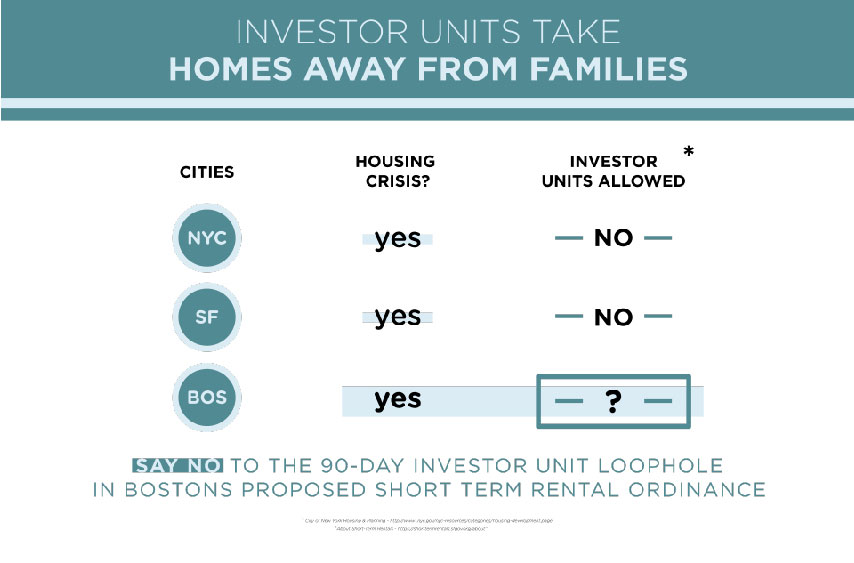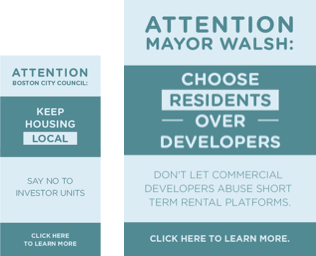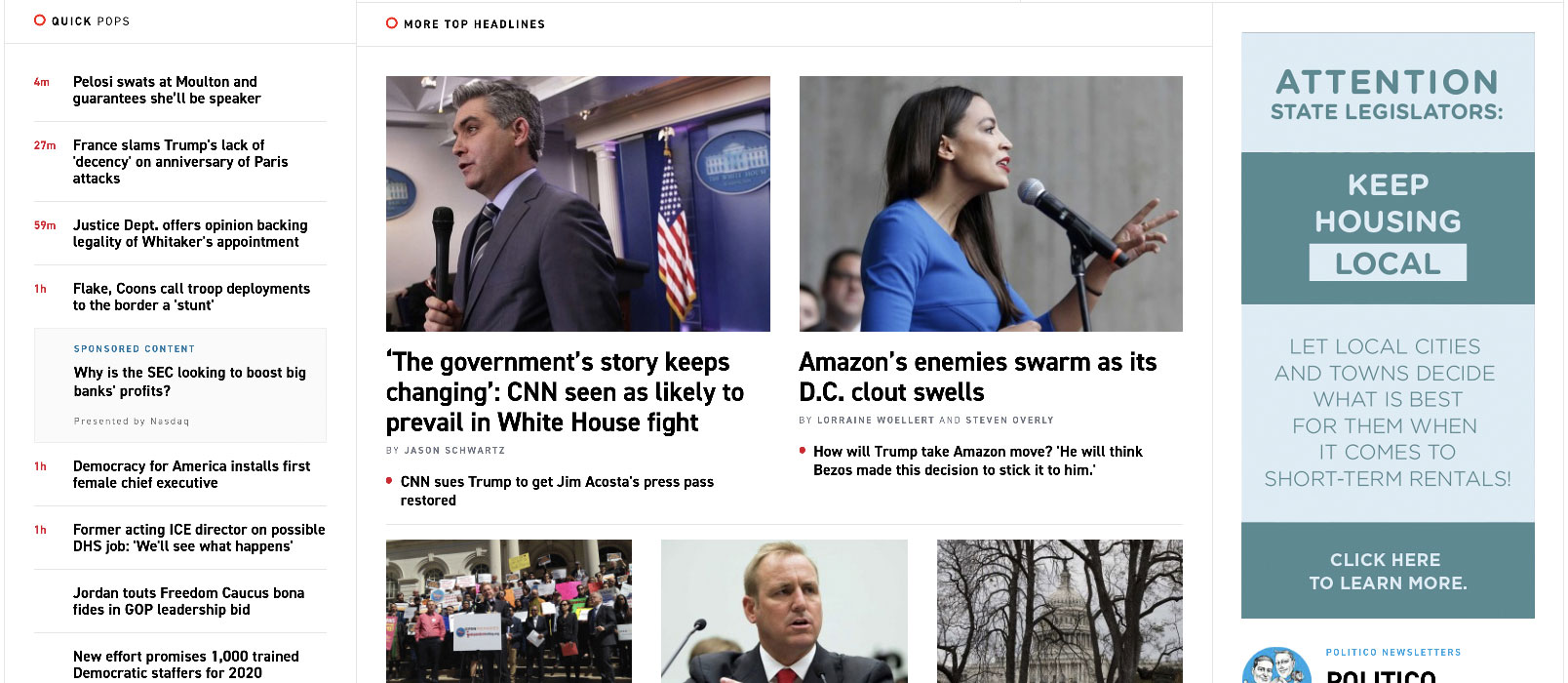Technological advancement, while the driving force behind our 21st Century economy, can be characterized by its rapid pace and resulting disruption. While technological “disruption” is most often viewed in terms of its impact on an industry’s workforce or the overall economy, in certain instances the disruption carries unintended – sometimes negative – societal impacts. Often times government oversight and regulation cannot keep pace with such advances in technology.
Case in Point
Short-term rental platforms such as AirBNB operate on a global scale, but have brought about unforeseen challenges in local communities. Created as an easy means to connect travelers with local private accommodations via a smart phone or computer, short-term rental platforms have grown beyond offering “mom and pop” rentals to including large-scale investor and corporate interests.
Beyond operating as de facto unregulated and untaxed hotels, the inclusion of investor-owned housing units as short-term rentals removes housing stock from local markets. In tight and expensive housing markets, such as Boston, the growth of short-term rental platforms serves to further exacerbate the problem.
In Boston, where housing costs are among the highest in the country, government leaders are attempting to tackle the issue in a bi-partisan fashion. Since taking office in 2014, Boston Mayor Marty Walsh has focused much of his administration’s efforts on what is known as Boston 2030 – a plan to build some 50,000 units of new housing within city limits by 2030. Governor Charlie Baker plans to make housing a key component of his Administration’s agenda in his second term.
The impact of short-term rentals on the local housing market came into stark focus for members of UNITE HERE Local 26 in late 2016. At that time the union, which represents local hotel workers, was approached by investors seeking to enter the short-term rental market. The investors were interested in contracting union housekeepers to work at short-term rental facilities in and around Boston.
Coincidentally, Local 26 discovered that the very members who might be employed by the short-term rental company, also lived at the location and faced being dislocated from their homes. Union officials knew they had a growing problem that must be addressed.
Mapping Out a Plan
In early 2017, the Welcome Home Coalition (WHC) was formed to advocate to maintain local control over regulation of short-term rentals. In addition, the Coalition called upon cities such as Boston and Cambridge to prohibit investor-owned housing units from being rented as short-term rentals.
The Welcome Home Coalition was comprised of a broad range of housing advocacy groups, community development organizations, and UNITE HERE Local 26.
Early in 2017, legislation was filed in both the Massachusetts House and Senate to regulate the short-term rental market. The Senate bill, backed by AirBNB and other short-term rental companies, largely focused on the issue of taxation and created uniform statewide regulation.
Alternatively, the House version created a state-wide regulatory framework that would allow cities and towns the flexibility needed to create local regulations that fit community needs. Like the Senate bill, the House version also established a tax structure.
Spearheaded by AirBNB, the short-term rental industry embraced the tax proposals, and supported the Senate’s streamlined regulatory approach that would prohibit cities and towns from restricting the type of short-term rentals allowed to operate locally. This approach would grant the unrestricted ability for investor and corporate owned units to grow.
While the issues were being debated on Beacon Hill, Boston and Cambridge began to develop local bylaws and regulations governing short-term rentals. The industry openly opposed these efforts, claiming that such steps would burden “mom and pop” operators, as well as harm the Commonwealth’s reputation as a hub of invention.
A Campaign Begins
Upon the creation of the WHC, immediate steps were taken to develop a brand identity, and accompanying website and social media presence. It was important for the WHC to grow an organic following of supporters from the impacted communities, as well as across the region. Support was cultivated through the use of digital assets like social media engagement and online petitions.

Regular meetings of WHC members took place throughout the process, both to develop strategy and to fine-tune advocacy efforts. While broad interest existed within the group on a variety of important housing issues, the decision was made early in the process for the Coalition’s to maintain a narrow focus.
Focus was placed on the simple concept to “Keep Housing Local.” This involved a two-front approach, one focused on the pending legislation on Beacon Hill, while the other focused on the level engagement in Boston and Cambridge.
Grassroots Development
Various audiences were reached using digital tools, with targeted messaging aiding rapid engagement. Growth was assisted by the simple and unified message, easily understood by potential supporters.
Online advertising focused in the impacted communities on renters and, to a more limited degree, homeowners. Ads helped build brand identity, as well as provided interested parties with important information on the issues at hand through strategic email outreach.

Supporters were encouraged to contact their local officials and attend local meetings on short-term rentals. This level of organic civic engagement ensured ongoing communication with local officials.
While developing local grassroots support, the WHC began to engage legislators and staff on Beacon Hill. Early in the advocacy process on Beacon Hill, the coalition lacked brand identity, which initially impeded the WHC’s ability to impact the debate within the State House effectively.
Through the use of digital tools and online advertising, CKS quickly established a known presence for the WHC on Beacon Hill. Paramount amongst these strategies was the use of geofencing digitals ads seen exclusively by those working in and adjacent to the State House. This technique ensured that valuable and limited resources were not wasted.
Similar to local online ads, those seen within the State House contained a succinct message to keep housing decisions local and linked to the WHC website for further information.

Within days of the start of online ads, a recognizable brand was established for the WHC on Beacon Hill, allowing WHC advocates a receptive response speaking with legislators and their staff. In the months to follow, WHC held informational meetings with a wide range of key legislators and staff.
Also during this time, the legislature held a series of public hearings across Massachusetts to gain public input on short-term rentals. Using digital media, the Coalition helped build supportive audiences at each hearing location.

Opposition Missteps
Throughout the 2017-18 Legislative session, efforts put forth by AirBNB appeared mired in missteps.
Massachusetts politics are notoriously parochial affairs. This is especially true in the cities of Boston and Cambridge, both of which have proud and storied political histories dating back to 1630. As such, public affairs activities must be nuanced to account for local issues, personalities and sentiment.
We believe AirBNB erred in their attempt to utilize the same tactics and messaging employed by their public affairs team in other states, with apparent disregard for the local audience.
The first public example came in June 2017, at a public hearing at the Massachusetts State House on short-term rental legislation. AirBNB – a San Francisco-based company – selected an internal out-of-state government affairs director to act as the company’s sole public face, in lieu of seeking locally-based representation. In their testimony, AirBNB presented a global argument using examples not specific to Massachusetts, which appeared to fall flat with the legislators present.
A better, more impactful approach would have been to localize AirBNB’s case by showcasing local residents who have benefited from involvement on their short-term rental platform.
Throughout the process in Boston, AirBNB engaged in a marketing attack that utilized both traditional and digital media. However, their approach did not appear to be targeted or strategically designed to effectively communicate with Boston residents.
A year later, in June 2018, AirBNB created a more egregious misstep during the City of Boston’s deliberations over short-term rental regulations. This misstep involved public attacks on Boston City Councilor At-Large Michelle Wu. A vocal critic of the impact of short-term rentals on local housing, Wu was the lead advocate on the City Council for strong local regulation. Wu, a former Council president, is among the most popular political leaders in Boston. She maintains a robust support network across the city.
AirBNB embarked on a public campaign, driven through social media, in an attempt to discredit and personally attack Wu. This had the immediate impact of enraging Wu’s supporters, as well as fellow city councilors and Mayor Marty Walsh – who in turn lashed out at AirBNB and called on the company to discontinue the attacks.
The smear campaign against Councilor Wu only served to discredit AirBNB and had had a negative impact on their campaign. This could have been avoided had the company relied on the advice of local consultants.
In November 2018, AirBNB attempted a final Hail Mary to overturn the City of Boston’s short-term rental regulations, set to go into effect on January 1, 2019. The once-cooperative company filed a lawsuit, previously eager to work in cooperation with the City to create regulations to the community’s benefit, took a sharp turn in tone and filed a federal lawsuit saying the regulations would violate state and federal law. The lawsuit specifically targeted the City’s requirement that short-term rental hosts must join an online-based city registry.
Results
On January 26, 2018, the City of Cambridge finalized regulations on short-term rentals that took effect that following April. These regulations, recognized as among the strictest in the country, were developed through a series of public community meetings in 2017. Among other restrictions, the city opted to prohibit investor-owned units from being rented as short-term rentals, instead limiting the market to residential units only.
Similarly, in June 2018, Boston passed its own local bylaws regulating short-term rentals. Boston’s regulations, which were vehemently opposed by AirBNB and the short-term rental market place, prohibit investor-owned units and strictly defined the type of dwellings that can be offered on such platforms.
At the state level, the WHC was successful in maintaining local option through legislation passed by both the House and Senate. The resulting Conference Committee report also maintained local option and was passed by the legislature in late July. The bill was initially returned to the legislature by Governor Charlie Baker, who requested changes to the language to relieve some of the regulatory requirements and address privacy concerns. The final legislation was passed, signed into law and has become a model for other states to use when regulating the short-term rental market palce.
